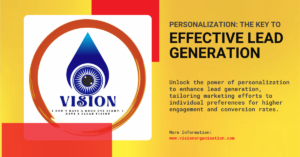Personalization: The Key to Effective Lead Generation – Introduction:
Personalization in marketing has emerged as a key strategy for lead generation due to evolving consumer behavior. In the past, generic marketing campaigns were the norm, but this approach has become less effective in today’s market. Consumers now expect personalized experiences that cater to their unique needs and preferences. As a result, personalization has become a critical component of successful lead-generation strategies.
The shift towards personalization is driven by the abundance of data available to marketers. With the rise of digital platforms, marketers can collect and analyze vast amounts of data about consumer behavior, preferences, and needs. This data can be used to create targeted marketing campaigns that speak directly to individual consumers. By tailoring marketing messages to specific consumer segments, marketers can increase engagement, generate leads, and ultimately, drive sales. Personalization not only improves the effectiveness of marketing campaigns but also enhances the overall consumer experience, leading to higher customer satisfaction and loyalty.
Understanding Personalization in Lead Generation:
Personalization in lead generation is the art of tailoring your marketing approach to intimately address the unique needs and preferences of your target audience, forging deeper connections and driving more meaningful engagement. This goes beyond simply addressing someone by their first name in an email; it’s about delivering relevant content, offers, and experiences that speak directly to the individual.
By leveraging data and technology, marketers can now create highly personalized campaigns that engage prospects on a deeper level. From personalized email campaigns to dynamic website content, the possibilities for personalization are endless.
Benefits of Personalization in Lead Generation:
Increased Engagement: Personalized content is more likely to capture the attention of your audience and keep them engaged with your brand.
Improved Conversion Rates: When prospects feel like you understand their needs and can provide solutions, they are more likely to convert into leads or customers.
Enhanced Customer Experience: Personalization creates a more positive experience for your audience, leading to stronger relationships and increased loyalty.
Better ROI: By targeting your efforts towards individuals who are more likely to be interested in your offerings, you can achieve a higher return on investment.
Strategies for Implementing Personalization in Lead Generation:
Segmentation: Divide your audience into segments based on demographics, behavior, or preferences to deliver targeted messages.
Behavioral Tracking: Use data analytics to track how prospects interact with your content and tailor your messaging accordingly.
Dynamic Content: Create personalized content that changes based on the viewer’s preferences or past interactions with your brand.
Personalized Email Campaigns: Customize your email campaigns with relevant content and offers based on the recipient’s interests.
AI and Machine Learning: Utilize artificial intelligence and machine learning algorithms to analyze data and predict customer behavior for more effective personalization.
Case Studies: Successful Implementation of Personalization:
Amazon: The e-commerce giant uses personalized product recommendations based on past purchases and browsing behavior to drive sales.
Netflix: By analyzing viewing habits and preferences, Netflix offers personalized movie and TV show recommendations to keep users engaged.
Spotify: Spotify curates personalized playlists for each user based on their listening history and preferences, enhancing the user experience.

In today’s competitive market, personalization has become a necessity for effective lead generation. By understanding your audience, leveraging data-driven insights, and implementing personalized strategies, you can create meaningful connections with prospects and drive conversions. Personalization is a critical strategy in today’s marketing landscape, where consumers expect tailored experiences that cater to their unique needs and preferences. By embracing personalization in lead generation efforts, businesses can unlock their full potential and thrive in the age of individualized marketing. Personalization involves tailoring marketing messages, content, and offers to individual customers based on their interests, behaviors, and preferences. This approach can help businesses stand out from the competition, build stronger relationships with customers, and ultimately drive higher conversion rates and revenue growth.

